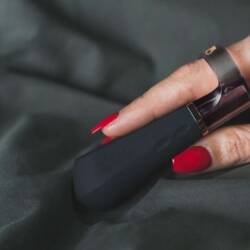Creating a Buzz: The Case for Required Disability Training in Sex Tech
It’s time for sex shops and brands to start selling the idea of inclusivity.

I was only 19 years old when I joined a somewhat tame high street retail sex shop as a sales assistant. I had no idea how my body worked but somehow was trusted to advise others on what could work for theirs.
It was a strange time to be in the industry as we were deep into the naughty noughties, and sex was going mainstream through pole dancing and Paris Hilton tapes. Sex sold, but it was packaged as something enjoyed by non-disabled, airbrushed, glossy people—people who were worlds away from the customers I served.
My training was brief and focused on the till and upselling. There was no training on how to use the vibrators or asking open-ended questions to discover more about a customer’s needs. There was also no mention of disability, queerness, or neurodiversity.
Customers would ask for the best toy to suit their needs, which included things like dexterity issues, pain, or accessibility. I would listen in a panic, knowing that I had no idea what would work. When in doubt, I would sell them the bestseller. The company placed huge targets on this and pressured us into selling at least two daily (at €100 each).
Sadly my experience isn’t unique.
Speaking with sales assistants in sex shops today, they still don’t know how to handle recommendations for non-binary people, neurodiversity, or disabilities.
Selling sex to a customer that doesn’t exist
Bethany Martin worked for a sex toy company that focused on sexy accessories, but her role also included customer service. As a neurodiverse person, she began to feel isolated by the lack of training.
“The only training I got was my first week when I was pushed into the warehouse. They said if I worked there for a week then I would know the products better which would make customer service easier,” Martin says.
“When they were telling us about the products, that information was never important. We sold one product that was meant to be for doggy style but through my research, I found it was great for people with hip pain or discomfort. This wasn’t a thing the company ever brought up though.”
Bethany began to feel that others at the company did not match her enthusiasm for the role. Many of her colleagues were jaded by the lack of training or felt embarrassed working in a vice industry. The sex industry image of ‘the perfect customer’ also didn’t fit with the people she saw buying the items.
“They created an image of the super sexy, able-bodied, neurotypical people buying it, but they weren’t keen on the actual people buying the stuff. I began to feel like an outsider in the office,” she says.
RELATED READ: How embracing my ADHD led to better orgasms
Being inclusive doesn’t necessarily require extra costs or licences
Jennie Williams is the CEO of Enhance the UK, which offers training for companies on disability awareness. Despite the huge market potential for inclusive toys, she has never been approached by a sex toy company.
“There are a lot of considerations right from the start of the journey. How do you buy the toy? Is the website accessible? Is it online? Can you easily find what you are looking for? If you do order it and it arrives, can you open the packaging? How difficult is it to switch on? Can you use the toy? If you have poor dexterity then can you use it or will your hands hurt from holding it? There are potential issues from the beginning of buying all the way to purchasing a toy,” says Williams.
“We have never been approached by a sex company which feeds into the narrative that people think disabled people don’t have sex. Companies don’t think about the issues that could be involved so even if they did slight adjustments, they could open themselves to a whole new market,” she continues.
“It’s not even about adjustments as it could be the marketing or having conversations with disabled people who don’t think they can use the products but actually can.”
Williams highlighted that sex toy companies might worry that this will mean spending money or potential new licenses. But in fact, it’s a lot simpler than that:
“You can make selling sex toys more inclusive by asking a few simple questions or having the training available. It gives people the confidence to ask the questions they need to.”
Image sources: Klugzy Wugzy

















